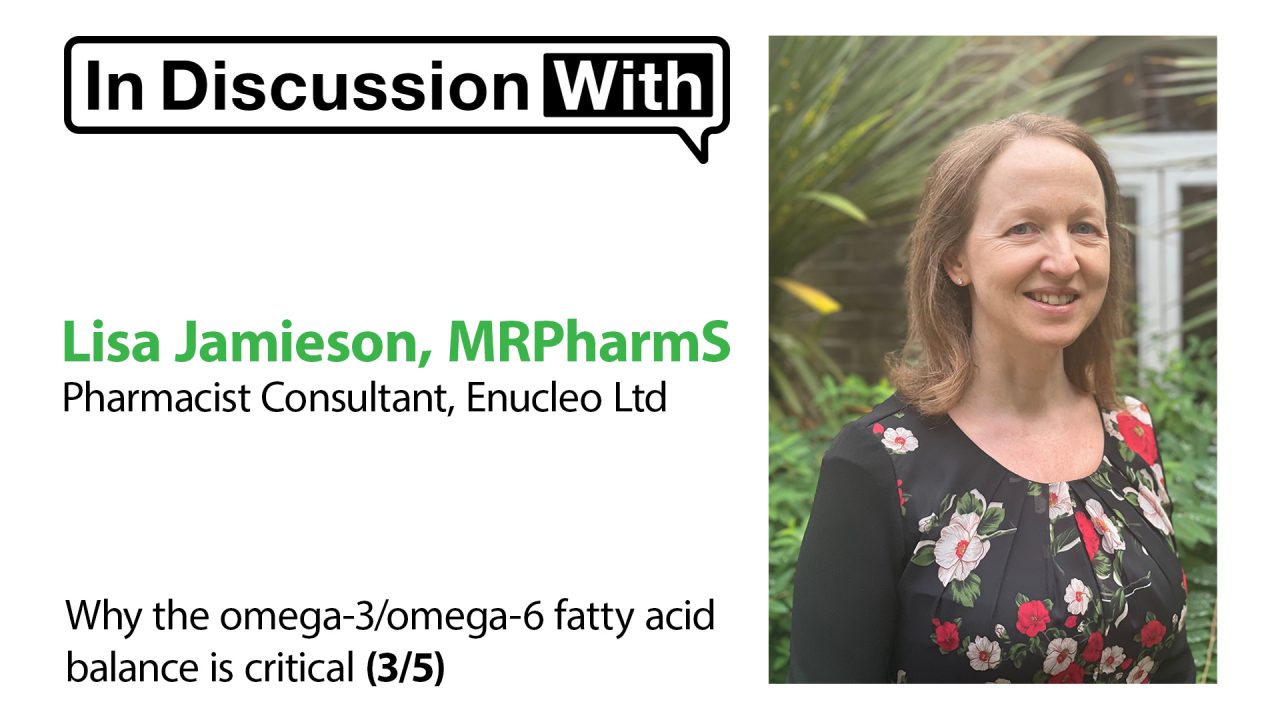Advertisment
Why the omega-3/omega-6 fatty acid balance is critical

Omega-3 and omega-6 fatty acids are both essential components of the diet and precursors for inflammatory and anti-inflammatory mediators and a balanced intake may even reduce the need for some medication, explains Lisa Jamieson, pharmacist consultant in nutrition.
Ideally the diet should contain similar amounts of omega-3 and omega-6 fatty acids. However, the modern Western diet contains abundant quantities of omega-6 fatty acids, from vegetable oils, nuts, seeds, grains, meat, eggs and dairy products and lesser amounts of omega-3 fatty acids, which are derived from green leafy vegetables, fish, seafood and some nuts, explains Lisa Jamieson.
A person may not get the benefit of omega-3 supplements if their diet is “awash with omega-6 fatty acids”, she says.
The human body needs both omega-3 and omega-6 fatty acids. They are essential fatty acids that cannot be made by the human body and must be consumed as part of the diet. Unlike plants, humans cannot convert omega-6 fatty acids to omega-3 fatty acids. “We can metabolise both types of the shortest chain fatty acids into longer chain fatty acids but we’re not very efficient at that and there are increasing amounts of research that show that it is better to get some of these longer chain polyunsaturated fatty acids directly from the diet. So, for example, the EPA (eicospentaenoic acid) and the DHA (docosahexaenoic acid) directly come from fish and seafood”, explains Ms Jamieson. (See figure 1)

Figure 1
Importantly, the metabolic products of omega-6 fatty acids are inflammatory mediators whereas the metabolic products of omega-3 fatty acids are less inflammatory or anti-inflammatory mediators. “So, the balance of these substances within our diet can increase or decrease our propensity towards inflammation. A diet that’s more rich in omega-3 fatty acids will be a much more anti-inflammatory diet whereas a diet that’s very rich in omega-6 fatty acids will be a more pro-inflammatory diet”, she says. (See figure 2)

Figure 2
A number of drugs block the effects of inflammatory mediators including, aspirin and non-steroidal inflammatory drugs (e.g. ibuprofen) which interfere with the action of cyclo-oxygenase (COX) to reduce the production of inflammatory mediators (see figure 3). Similarly, leukotriene receptor antagonists are used to counter inflammation in respiratory conditions, explains Ms Jamieson. “It is important for us to consider that what we eat can influence our propensity towards inflammation and, actually, if we get the balance better with omega-6 and omega-3 within our diet we may create a less inflammatory state and we may reduce the need for some of these medicines. If you can reduce the inflammation in a person’s body, they may reduce their symptoms and reduce the need for these medicines”, she says.

Figure 3
Turning to the advice that might be offered to someone who wishes to increase the amount of omega-3 fatty acids in their diet, Ms Jamieson suggests adoption of a Mediterranean diet. Typically, this would be “a diet that’s high in fish and seafood balanced with vegetables – taking the beige out of your diet”, she says. This involves removing all the pre-packaged supermarket foods, because they tend to be the ones that are high in seed oils and grains, and switching to a diet that is richer in vegetables, fish and seafood “There is some research that shows that you can change the balance within your cells of omega-3 and omega-6 within a week of changing”, she explains. Of course, this is no different from the advice that has long been offered to people who have had heart attacks. “I think it’s important to tell people to eat more vegetables, more fish and seafood, particularly oily fish, like salmon or mackerel or sardines”, she concludes.
About Lisa Jamieson
Lisa Jamieson BPharm (Hons), MSc (Clin Pharm), MSc (Nutr Med), MRPharmS
Lisa Jamieson currently works as a pharmacist consultant from her own company, Enucleo Ltd. She has a portfolio career with two main roles – first, as a senior consultant in a market access consultancy, working at the interface between the pharmaceutical industry and the NHS and second, as a pharmacist consultant in nutritional medicine. This latter role involves educating pharmacists and other healthcare professionals either in writing or as a speaker at conferences.
Read and watch the full series on our website or on YouTube.





